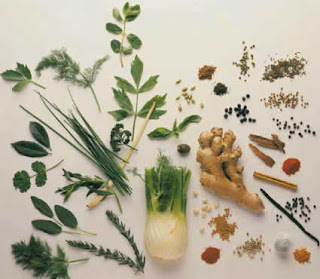Herbs differ from spices in that they are made up of the leaves of plants, while spices can be seeds, bark or other parts. Herbs generally have a more delicate flavor than spices. Thus, they may be more appealing to children, whose taste buds are more acute. The most common herbs are basil, bay leaf, burnet, chervil, chives, cilantro, dill, lovage, marjoram, mint, oregano, parsley, rosemary, sage, savory, sorrel, tarragon and thyme. If you aren't familiar with all of these, there is no time like the present to introduce yourself to some potential favorites. If curiosity doesn't motivate you, try some of these other reasons to get acquainted with herbs.
1.Growing Herbs Can Be An Educational Activity
When warm weather approaches and the school year comes to a close, it is the perfect time to consider a small garden of herbs. These leafy flavor enhancers add a little something extra to the ordinary salad, and gardening is a great way to teach young ones how food is grown. Seeds are inexpensive and even if you don't have a lot of room, herbs can be grown in small containers. If you do have the room, think of growing your own salad with radishes and unusual lettuces of varying colors, shapes and sizes.
2. Growing Herbs Can Be Great Physical Work
Bending to weed and taking a daily trip out to the garden are easy ways to get a little exercise. Let your children plant the seeds. Have them make markers of what, when and where they planted items. Both of you will enjoy the "overnight" appearance of the early sprouts. There is nothing like a daily trip to the garden to bond with the kids and gather your meal. You might even mimic Thomas Jefferson and keep a journal of what is sprouting and when. It will give you a head start on planning future gardens.
3. Herbs Are the Source of Vitamins to a Meal
There is a reason that many people use herbs to cure what ails them. Herbs contain many vitamins and nutrients. Dare you consider eating herbs because they are good for you? Broaden your thinking and see if you can incorporate herbs in all three meals. For breakfast spice up your eggs with tarragon. Perk up that plain cottage cheese with basil and savory. At dinner, pull out the crockpot and let the food cook slowly with the addition of bay leaf. The latter is one of the few herbs that can withstand prolonged cooking.
4. You Can Make Herbs Last Longer Than You Think
Many people avoid buying herbs because they wilt so fast, and you end up throwing a good portion of them away. You can make them last longer by cutting them up and dropping them in ice trays, pouring water over them and letting them freeze. Freeze these ready-made portions when you need them. On the opposite spectrum, you can tie them in a bundle with a rubber band and place them in a sunny window. Let them dry. When they are crackly as an autumn leaf, break them up and place them in a spice (or in this case) an herb jar. Either way you are extending their delicate lives and preventing that guilty feeling you get when you have to throw something away.
5. Herbs Are a Better Choice Than Processed Foods
It is a fact that the closer you are to eating directly from a garden or fresh produce at the store, the healthier it is for you. This is especially true if you worry about the chemicals and reduction of vital nutrients that are involved with overly processed foods in packages and cans. If you can find a magical combination of herbs that all of your children will like, perhaps you can get them to eat more foods that are good for them. Try grinding a little fennel seed over vegetables. It tastes like licorice and just might do the trick. A bit of mint is also a tasty alternative. Be aware that both thyme and mint come in a variety of flavors, including pineapple and chocolate.

No comments:
Post a Comment